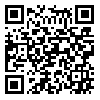Volume 8, Issue 4 (Autumn 2020)
PCP 2020, 8(4): 325-334 |
Back to browse issues page
Download citation:
BibTeX | RIS | EndNote | Medlars | ProCite | Reference Manager | RefWorks
Send citation to:



BibTeX | RIS | EndNote | Medlars | ProCite | Reference Manager | RefWorks
Send citation to:
Nasiry S, Ameli Z, Pezeshki P. Online Cognitive Bias Modification of Interpretation for Children With Obsessive-Compulsive Disorder. PCP 2020; 8 (4) :325-334
URL: http://jpcp.uswr.ac.ir/article-1-724-en.html
URL: http://jpcp.uswr.ac.ir/article-1-724-en.html
Online Cognitive Bias Modification of Interpretation for Children With Obsessive-Compulsive Disorder
1- Department of Clinical Psychology, School of Medicine, Shahid Beheshti University of Medical Sciences, Tehran, Iran. , snasiry@sbmu.ac.ir
2- Department of Social Sciences, Faculty of Letters and Human Sciences, Shahid Beheshti University, Tehran, Iran.
3- Department of Clinical Psychology, School of Medicine, Shahid Beheshti University of Medical Sciences, Tehran, Iran.
2- Department of Social Sciences, Faculty of Letters and Human Sciences, Shahid Beheshti University, Tehran, Iran.
3- Department of Clinical Psychology, School of Medicine, Shahid Beheshti University of Medical Sciences, Tehran, Iran.
Abstract: (4677 Views)
Objective: Numerous children with Obsessive-Compulsive Disorder (OCD) either have no access to its main treatment, i.e. Cognitive Behavioral Therapy (CBT), or fail to respond to it. Cognitive Bias Modification of Interpretation (CBMI) is a novel and promising intervention that targets the incorrect interpretation of intrusive thoughts and impulses, i.e. the characteristics of OCD. The present study aimed to determine the effects of CBMI in children with OCD for the first time. Besides, we evaluated the possibility of online implementation of this intervention.
Methods: A sample of 35 children with OCD (aged 7-12 years) were randomly assigned to two study groups. The experimental group (n=18) received CBMI and the controls (n=17) received placebo treatment. Interpretation bias and OCD severity were assessed at pre-test, post-test, and 2-month follow-up stages, using the Obsessive Compulsive Inventory-Child Version (OCICV), Obsessive Beliefs Questionnaire-Child Version (OBQCV), and Ambiguous Scenarios Task (AST). The present study results were analyzed using two-way repeated-measures Analysis of Variance (ANOVA) and Paired Samples t-test.
Results: The collected findings demonstrated that after receiving CBMI, children’s propensity to positively interpret ambiguous situations was increased, their tendency towards negative interpretation and OCD severity was also decreased. There was no such significant change in the control group. Furthermore, the effects of CBMI was sustained at the 2-month follow-up step.
Conclusion: This study provided preliminary evidence that suggests CBMI is capable of modifying interpretation bias in children with OCD, can reduce the severity of their disorder, and works as an online intervention. This brief and inexpensive intervention could be considered as an auxiliary or standalone treatment for OCD in children.
Methods: A sample of 35 children with OCD (aged 7-12 years) were randomly assigned to two study groups. The experimental group (n=18) received CBMI and the controls (n=17) received placebo treatment. Interpretation bias and OCD severity were assessed at pre-test, post-test, and 2-month follow-up stages, using the Obsessive Compulsive Inventory-Child Version (OCICV), Obsessive Beliefs Questionnaire-Child Version (OBQCV), and Ambiguous Scenarios Task (AST). The present study results were analyzed using two-way repeated-measures Analysis of Variance (ANOVA) and Paired Samples t-test.
Results: The collected findings demonstrated that after receiving CBMI, children’s propensity to positively interpret ambiguous situations was increased, their tendency towards negative interpretation and OCD severity was also decreased. There was no such significant change in the control group. Furthermore, the effects of CBMI was sustained at the 2-month follow-up step.
Conclusion: This study provided preliminary evidence that suggests CBMI is capable of modifying interpretation bias in children with OCD, can reduce the severity of their disorder, and works as an online intervention. This brief and inexpensive intervention could be considered as an auxiliary or standalone treatment for OCD in children.
Keywords: Cognitive bias modification, Interpretation bias, Obsessive-Compulsive disorder, Online intervention, Children
Type of Study: Applicable |
Subject:
Cognitive behavioral
Received: 2020/01/20 | Accepted: 2020/04/20 | Published: 2020/10/1
Received: 2020/01/20 | Accepted: 2020/04/20 | Published: 2020/10/1
| Rights and permissions | |
 |
This work is licensed under a Creative Commons Attribution-NonCommercial 4.0 International License. |








